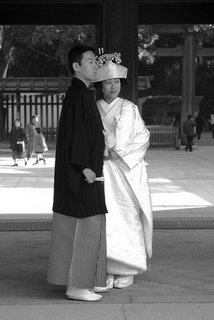Friday, December 30, 2005
Sunday, December 25, 2005
Golden Gai, Higashi Shinjuku

An earthy taste of Tokyo's past that may not survive much longer the onslaught of development, Golden Gai is a a row of tiny alleys that contain some 200 stand-up counter bars. Each houses only a few, inevitably regulars as most are member only establishments. A traditional haunt of writers and other free spirits. Apparently much loved by Tokyo's photography icons Moriyama Daido and Araki Nobuyoshi.

Saturday, December 24, 2005
Sunday, December 18, 2005
Ginza Yon-chome Crossing

The "gin" in Ginza means silver, and coins were minted in this area from early in the Edo period (1600 - 1868). From there it evolved into a world famous mecca for upscale (well, for most people, off scale) stores, restaurants, cafes, and clubs. In the cafe above the iconic Wako department store, for example, you and a companion can enjoy an afternoon tea and sliver of cake for 5000 yen. Nearly outdone in recent years by competition from other swank districts such as Omotesando, of late Ginza has seen a revival with the installation of several new big name boutiques and restaurants.

Chuo-dori, Ginza

Ginza affords people watching extraordinaire, particularly on the weekends when Chuo-dori is reserved for pedestrians. As Christmas approaches, shoppers swarm the streets and clot the department store aisles. Though there is no dominant religion and in fact not a lot of taste for religion in general here, this holiday adopted from the West has caught on largely due to national obsessions with shopping and fashionable goods. Chanel takes 50% of their global revenue from the Japanese market alone, and according to a 2002 survey a staggering 94% of Tokyo women in their 20s own a Louis Vuitton product (plus 92% own Gucci, and so on). So products whose intended appeal was to set the owner apart have become a requirement just to be part of the group. This should perhaps not be surprising if one considers the analogy with work - for decades certain people in the West were working extra long hours to try to get ahead of their peers, while in Japan nearly everyone did so just to keep up. This, of course, is changing, but the brand mania is not. There's something sad about women feeling compelled to part with the price of a month's rent (though most in fact live with their parents) just for a handbag, to say nothing of the things some have reportedly done to secure the funds, while the Vuitton people have seen their wildest dreams eclipsed by reality.

Sunday, December 04, 2005
Train, Ikebukuro


Trains and subways are part of the fabric of daily life in Tokyo. In fact, it seems nearly any location in the entire country can be reached by some form of public transportation - subways, trains, buses, ferries, or (a last resort but frequently used) taxis. This doesn't prevent the streets and highways from being clotted with cars and trucks, though late at night in central Tokyo the majority of vehicles on the road are taxis. The typical commuter is spared the stress of traffic jams and bad drivers, but depending on one's schedule and the line used this can be replaced by a long, sweaty, straphanging ride in a crush of fellow sufferers. Still, owning a car is unnecessary in Tokyo and the costs are formidable: parking alone costs more in a month than a payment on a very comfortable car would in most countries, and this is before even considering the cost of gas, tolls, insurance, and the car itself.
Saturday, December 03, 2005
Hanayashiki Amusement Park, Asakusa

Hanayashiki is a small amusement park from the 1950s, somehow still surviving (though one suspects just barely) despite the proliferation of newer and far trendier parks such as Tokyo Disney. The number of rides and other attractions packed into such a tiny area is astonishing, all right in the middle of Asakusa in Tokyo's shita-machi or old town.




